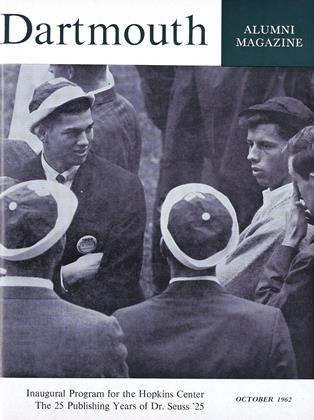As Weatherly and Gretel crossed the starting line off Newport on September 15, to begin their series of races for the America’s Cup, Emil (Bus) Mosbacher Jr. ’43 was at the helm of the 12-meter U. S. entry Weatherly. This fact, the yachting experts almost unanimously agreed, was the single biggest reason for predicting that the Australian challenger, like seventeen challengers before it, would go home without the Cup.
The choice of Weatherly as America’s defender focused international attention on Skipper Mosbacher, but among U. S. yachtsmen he has long been a renowned figure. “Bus Mosbacher has proved him- self the outstanding helmsman of this era, both in his grasp of tactics and his ability to make a boat move through the water, especially to windward,” wrote yachting editor Carleton Mitchell in Sports Illus-trated last month.
The members of MosbacheTs expert, razor-sharp crew call him “The Wizard,” and his genius at grabbing the advantage at the start is enough to give his oppo- nents the jitters before a race begins. “After four years of watching Bus on the starting line,” Mitchell wrote, “I am still amazed at his knack of bending al- most any situation to his advantage. . . .
No matter what his opponents may do, Mosbacher is usually where he wants to be when the gun sounds.”
Backing up Weatherly’s gifted skipper is the ten-man crew that sailed with him in the New York Yacht Club’s elimina- tion series off Newport in August. After Columbia, the 1958 defender, and East-erner had been dropped, Weatherly took three straight races from Nefertiti in the finals and was promptly picked by the America’s Cup Race Committee. A mem- ber of the polished crew that shared this victory and remained intact for the races against Gretel was Leo (Buddy) Bom- bard ’55, who had the job of midships tailer, the man who winds the wire sheets around a winch. This assignment usually goes to a husky strongman, but Bombard at 140 pounds is “the little lion” and with a pair of lightning hands makes speed do for size.
The sailing experience that Mosbacher took into the America’s Cup races last month began to be acquired almost as soon as he was big enough to hold a tiller. His sailing has been done mainly on Long Island Sound, and there he won his first races as a midget. With his brother Bob, also a crack sailor thanks to their father’s early tutelage. Bus gradu- ated to a Comet, a Star, then an Atlantic, with which he won the Sound junior championship in 1939 and was runner-up for the Sears Cup, emblematic of the national junior crown. At Dartmouth he twice won the McMillan Cup and the in- tercollegiate championship.
After Navy service in the Pacific dur- ing the war, Mosbacher took up racing in a big way in the International class. With his sleek, blue-hulled Susan he raced against such topflight skippers as Cornelius Shields, Arthur Knapp, and Bill Cox, to all of whom Bus, in his usual modest way, gives credit for teach- ing him a lot. Beginning in 1950 he won the season’s International championship for eight straight years, and in six of those years he also won the Yacht Racing Association championship.
In 1958, Mosbacher proved his bril- liance by taking old Vim and almost beating Columbia in the America’s Cup trials. Last season he did better with Easterner than anyone else had been able to do since she was a loser in 1958, and this year he was asked to succeed Arthur Knapp as skipper of Henry Mercer’s Weatherly, which was virtually rebuilt for the Cup trials. With improved speed, especially in light winds, and Mosbacher at the helm, the Mercer entry was de- cidedly superior to her three rivals.
And so to the special delight of Dart- mouth men, the honor of defending the America’s Cup in 1962 went to Weath-erly and to the modest, smiling fellow who on dry land (occasionally) runs his New York oil and real estate business and serves as president of the Class of 1943 and as a member of the Alumni Council.
Weatherly, the U. S. defenderin the America’s Cup races, andBus Mosbacher ’43, her skipper.
 View Full Issue
View Full Issue
More From This Issue
-
 Feature
FeatureDr. Seuss
October 1962 By CLIFFORD L. JORDAN '45 -
 Feature
FeatureThe Vanishing Ability To Write
October 1962 By George O’Connell -
 Cover Story
Cover StoryThe Big Day Draws Near
October 1962 -
 Feature
FeatureTRUSTEES SANCTION A FOURTH TERM
October 1962 -
 Article
ArticleTHE FACULTY
October 1962 By George O’Connell -
 Sports
SportsWITH THE BIG GREEN TEAMS
October 1962 By Dave Orr ’57
Article
-
 Article
ArticleWASHINGTON'S BIRTHDAY EXERCISES
FEBRUARY, 1908 -
 Article
ArticleTHE HISTORY OF DARTMOUTH COLLEGE
January, 1914 -
 Article
ArticleClass of 1925 Creates Four- Year Scholarship
February 1952 -
 Article
ArticleSocial Idealism in College
December 1941 By ARTHUR E. JENSEN -
 Article
ArticleUnquiet Memories
MAY | JUNE 2014 By Lisa Furlong -
 Article
ArticleHANOVER BROWSING
November 1932 By Rees Higgs Bowen

